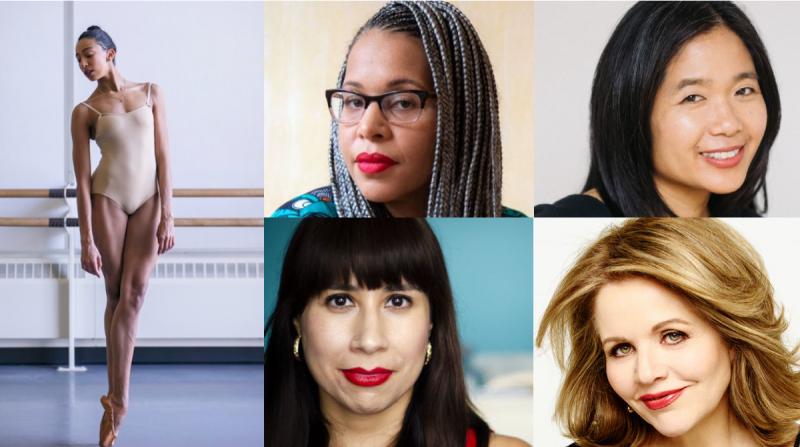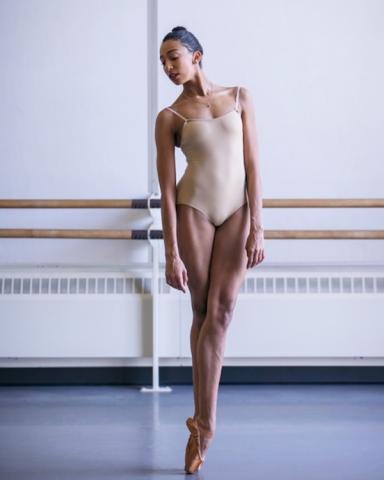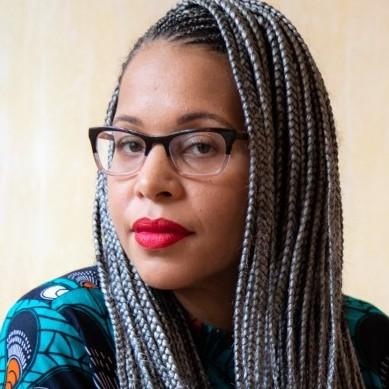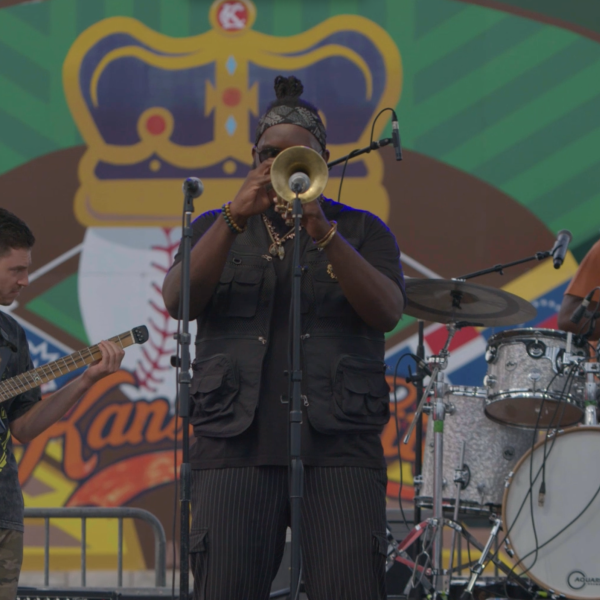Flashback Friday: Podcasts Featuring Phenomenal Women

Photo by (Top): Lindsay Thomas, Erin Patrice O’Brien, Andria Lo
(Bottom): Adriana Díaz, Andrew Eccles
The women who have been featured on the National Endowment for the Arts podcast share a number of attributes—creativity, resilience, and drive all come to mind—but there is also so much that makes them different, including how they use their various talents and platforms.
Ballet dancer and choreographer Amanda Morgan is the only Black female dancer at the prestigious Pacific Northwest Ballet, and she’s not afraid to call out her employer or the ballet community at-large for their failures to combat systemic racism. Author Vanessa Hua writes to reflect the reality of the Chinese-American experience, which is to say, there is not one Chinese-American experience. Renée Fleming is one of the most famous opera singers in the world, as well as a fierce advocate for music in health as a way to strengthen minds and alleviate suffering.
When speaking about the voice as an instrument, Fleming told the Arts Endowment, “Some voices are piercing. Some voices are incredibly warm. Some are huge. Some are refined and small. And they all reflect the human being that embodies that voice.” Listen to any (or all!) of the podcasts below, and we hope you will feel empowered to use your unique voice and tap into all that makes you phenomenal.

Pacific Northwest Ballet corps de ballet dancer Amanda Morgan. Photo © Lindsay Thomas
Amanda Morgan (Ballet Dancer, Choreographer, Activist) – On the podcast, Morgan spoke with the Arts Endowment about her career, including her experience with the Pacific Northwest Ballet; the mentorship program she co-founded; The Seattle Project, her interdisciplinary artist collective; and her commitment to activism against systemic racism. Speaking about how choreographing has given her more creative freedom, she said, “I think that Black women especially we tend to get pulled into being strong and fierce and all that, and then we can’t break out of that. That’s part of the reason why choreographing feels really nice too, because I can work around anything I want. I can have it be more harsh or more soft or whatever it is.”

Photo by Adriana Díaz
Erika L. Sánchez (Author, 2017 National Book Award finalist, 2019 NEA Literature Fellow) – Sánchez spoke with the Arts Endowment about her writing career and young adult novel I’m Not Your Perfect Mexican Daughter, which was nominated for the National Book Award, on the podcast last year. There are numerous parallels between Sánchez and her main character Julia, including their childhoods in Chicago as the children of Mexican immigrants. “I felt like I needed to write the novel that I needed at that age and that I know other girls need as well, because it's just really isolating and there's not a lot of literature that really represents the Mexican American immigrant child experience,” she said.

Photo by Erin Patrice O’Brien
Loira Limbal (Documentary Filmmaker) – Limbal is producer and director of Through the Night, a documentary about a home-based, 24-hour daycare center, which serves as a critical social safety net for mothers who work through the night. Limbal, herself a single mother of two, was determined to tell the story of the couple who runs this daycare center, as well as the mothers whose children are cared for there. “You know, the film is about childcare, but the same could be said about the women, mostly Black and immigrant women, who are the people that provide elder care, or that provide sick care, right? Like there's this way in which the work, the labor of caregiving is very disrespected and undervalued in our society, and as we're seeing in this moment, without caregiving, nothing else works,” she told the podcast.

Photo by Andria Lo
Vanessa Hua (Author and 2020 NEA Literature Fellow) – Hua spoke to the podcast about her book of short stories, Deceit and Other Possibilities – the theme of which she says is “model minorities behaving badly” – and her novel, A River of Stars – or, “a pregnant Chinese Thelma and Louise.” Hua shared how her background as a journalist and her experience as a second-generation Chinese American play into her fiction writing. “I think sometimes communities are viewed as monoliths with the same history, the same language or culture coming in, and although there are shared aspects, I think my novel reflects those differences,” she said.

Photo by Andrew Eccles
Renée Fleming (Opera Singer and 2012 National Medal of Arts Recipient) – Fleming is a four-time Grammy winning lyric soprano with a worldwide fanbase. Last year, she spoke on the podcast about her work to promote research about the connection between music and health, which includes the Sound Health Network, an Arts Endowment initiative that came about through Fleming's partnerships with the Kennedy Center and the National Institute of Health.
As we celebrate Women’s History Month this March, the National Endowment for the Arts will shine the light on some phenomenal women, past and present, through the agency’s blog, podcast, and social media channels. While the stats may continue to be disappointing in terms of equity, we believe that as we work to address those disparities it’s also important to celebrate the impact women have made and continue to make in the arts. From Phillis Wheatley, an enslaved woman who was also one of the best-known poets in pre-19th century America to dancer and choreographer Martha Graham, whose work lives on not only through her dancers but through the company’s venture into mixing dance with technology, we’re celebrating women who, to borrow from Maya Angelou’s famous poem “Phenomenal Woman” have fire in their eyes and joy in their feet.




